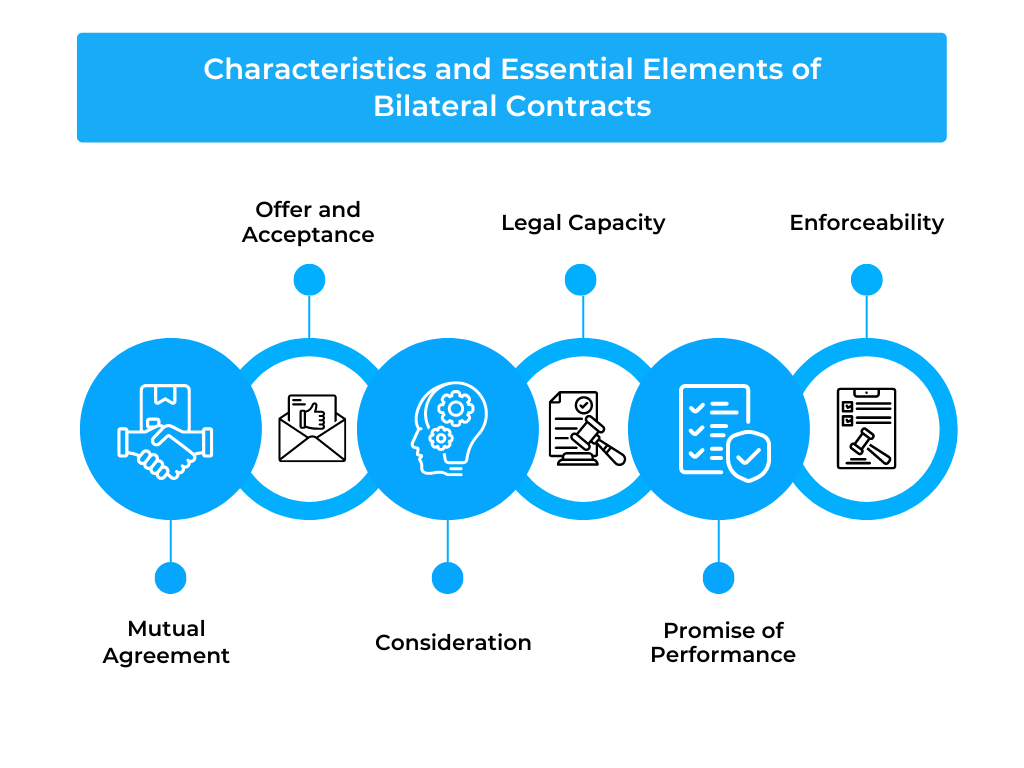Bilateral Contract
Introduction to Bilateral Contracts

Bilateral contracts form the foundation of countless transactions and agreements in various industries and sectors. Understanding the concept and features of bilateral contracts is crucial for individuals and businesses involved in contractual relationships. In a bilateral contract, two parties exchange promises or obligations to perform specific actions or provide certain goods or services. Unlike unilateral contracts, where one party makes a promise in exchange for the completion of a specific act by the other party, bilateral contracts involve mutual promises from both parties. This article provides an overview of bilateral contracts, highlighting their significance, key characteristics, and legal implications. By delving into the fundamentals of bilateral contracts, individuals and businesses can navigate contractual relationships with clarity and confidence.
Characteristics and Essential Elements of Bilateral Contracts

Bilateral contracts possess distinct characteristics and essential elements that define their nature and enforceability. Understanding these key aspects is essential for parties entering into bilateral contracts. The following are the characteristics and essential elements of bilateral contracts:
- Mutual Agreement: Bilateral contracts require the mutual assent or agreement of both parties involved. Each party must express their consent to the terms and conditions of the contract.
- Offer and Acceptance: A valid bilateral contract involves one party making an offer and the other party accepting that offer. The offer should be clear, definite, and communicated to the other party, who must accept the offer without any ambiguity or condition.
- Consideration: Bilateral contracts involve an exchange of valuable consideration between the parties. Consideration refers to the benefit or detriment each party receives or incurs as a result of the contract. It can be in the form of money, goods, services, or any other valuable asset.
- Legal Capacity: For a bilateral contract to be valid, both parties must have legal capacity. This means that they must be of legal age and possess the mental competence to understand the terms of the contract and its consequences.
- Performance or Promise of Performance: Bilateral contracts involve obligations and promises made by both parties. Each party is bound to perform their respective obligations as stated in the contract. Failure to fulfill these obligations can result in legal consequences.
- Enforceability: Bilateral contracts are legally binding, meaning that if one party fails to fulfill their obligations, the other party can seek legal remedies to enforce the contract or claim damages for any losses suffered.
Offer and Acceptance: Mutual Assent in Bilateral Contracts
In bilateral contracts, the concept of offer and acceptance plays a vital role in establishing mutual assent between the parties involved. An offer is a proposal made by one party to another, expressing their willingness to enter into a contract on specific terms. It should be clear, definite, and communicated to the other party, containing the essential elements of the contract. On the other hand, acceptance is the positive and unambiguous response to the offer, indicating the offeree’s willingness to be bound by the terms of the contract. Acceptance must be in response to the exact terms of the offer and communicated to the offeror in a timely manner. The meeting of minds between the parties, also known as mutual assent, is essential, ensuring a shared understanding of the contract’s rights, obligations, and expectations. Once an offer is met with unqualified acceptance, a contract is formed, and both parties are legally bound to fulfill their obligations. Effective communication throughout the offer and acceptance process is crucial, as it ensures that both parties are aware of the mutual assent and the formation of the contract. By adhering to the principles of offer and acceptance, parties can establish valid and enforceable contracts, providing a framework for their business relationships and protecting their rights.
Consideration: Exchange of Value in Bilateral Contracts
Consideration is a fundamental element of bilateral contracts that involves the exchange of value between the parties involved. It refers to something of legal value given by one party in exchange for something of legal value given by the other party. Consideration can take various forms, including money, goods, services, promises, or even refraining from doing something that one has the right to do. The concept of consideration ensures that both parties are mutually bound by their promises and that there is a fair and equitable exchange of benefits. It distinguishes a contract from a mere gift or gratuitous promise, as a contract requires a bargained-for exchange.
For a bilateral contract to be valid, consideration must be present and must have legal value. This means that the consideration must be something that the law recognizes as valuable, and it must be sufficient but not necessarily equal in value. The exchange of consideration creates a binding obligation on both parties, as they are giving up something of value to receive something in return. Consideration also serves other important functions in bilateral contracts. It helps to ensure the enforceability of the contract, as courts generally require consideration as evidence of the parties’ intention to be legally bound. Additionally, consideration promotes fairness and prevents unjust enrichment, as it ensures that both parties have a stake in the contract and that they are not taking advantage of each other.
Performance and Obligations in Bilateral Contracts
In bilateral contracts, performance refers to the fulfillment of the obligations agreed upon by both parties. Each party has specific duties and responsibilities that they are expected to perform under the contract. The performance of these obligations is essential for the contract’s successful execution and the satisfaction of both parties. Failure to fulfill these obligations may result in a breach of contract, which can lead to legal consequences. Proper communication, adherence to timelines, and meeting the agreed-upon terms and conditions are crucial in ensuring smooth performance in bilateral contracts.
Remedies for Breach of Bilateral Contracts
In the event of a breach of a bilateral contract, where one party fails to fulfill their obligations as agreed upon, various remedies are available to the non-breaching party. These remedies aim to provide compensation or restore the injured party to the position they would have been in if the breach had not occurred. Some common remedies for breach of bilateral contracts include:
- Damages: The non-breaching party may seek monetary compensation for the losses suffered as a result of the breach. The damages awarded can be in the form of compensatory damages, which aim to cover the actual loss incurred, or consequential damages, which account for additional losses resulting from the breach.
- Specific Performance: In certain cases, where monetary compensation may not be sufficient to remedy the breach, the court may order specific performance. This remedy requires the breaching party to fulfill their obligations as outlined in the contract.
- Rescission and Restitution: Rescission involves canceling the contract and returning both parties to their pre-contractual positions. Restitution aims to restore any benefits received by the breaching party to the non-breaching party.
- Reformation: In situations where the terms of the contract are found to be unclear or ambiguous, the court may order reformation, which involves modifying the terms to reflect the original intent of the parties.
- Liquidated Damages: Some contracts include a provision for liquidated damages, which specifies a predetermined amount of damages in the event of a breach. These damages are agreed upon by the parties at the time of contract formation.
Conclusion:
Future Trends and Developments in Bilateral Contract Law
In conclusion, the future of bilateral contract law will be shaped by various trends and developments. Digital contracts, electronic signatures, and blockchain technology will streamline contract formation and enforcement. Globalization will necessitate harmonization of laws and mechanisms for cross-border dispute resolution. Artificial intelligence will enhance contract management and dispute resolution processes. Ethical considerations, such as sustainability and social responsibility, will play a growing role in shaping bilateral contract formation and enforcement. These advancements aim to enhance the effectiveness, efficiency, and fairness of bilateral contract law in an interconnected and technologically advanced world.
Try our Debt Resolution solutions today Request a Demo